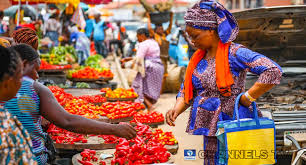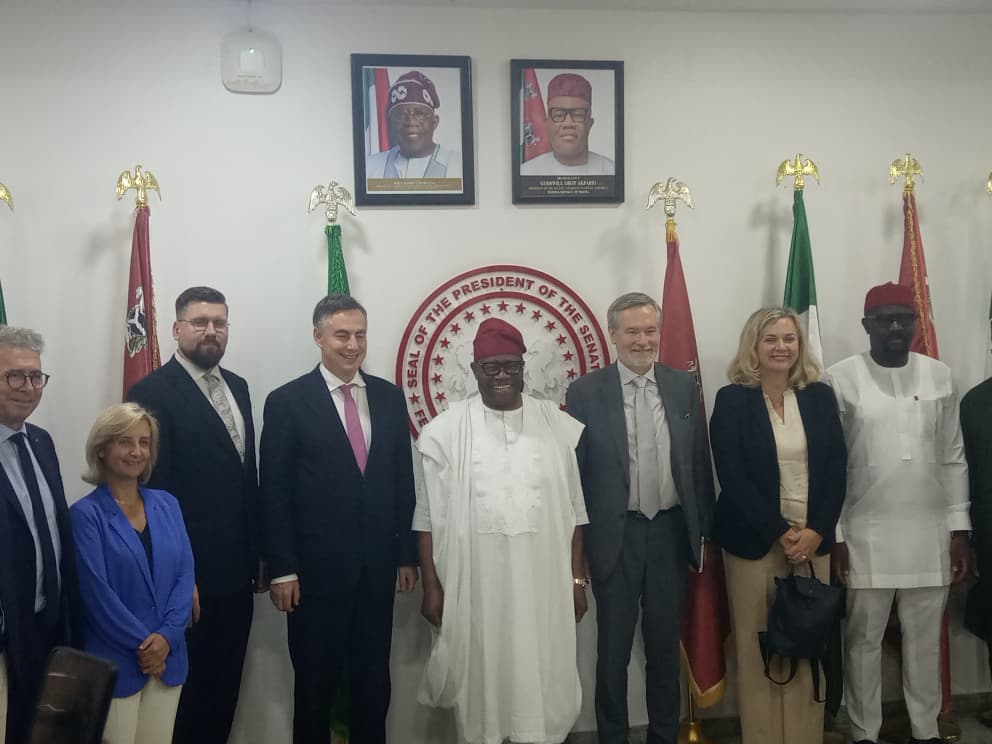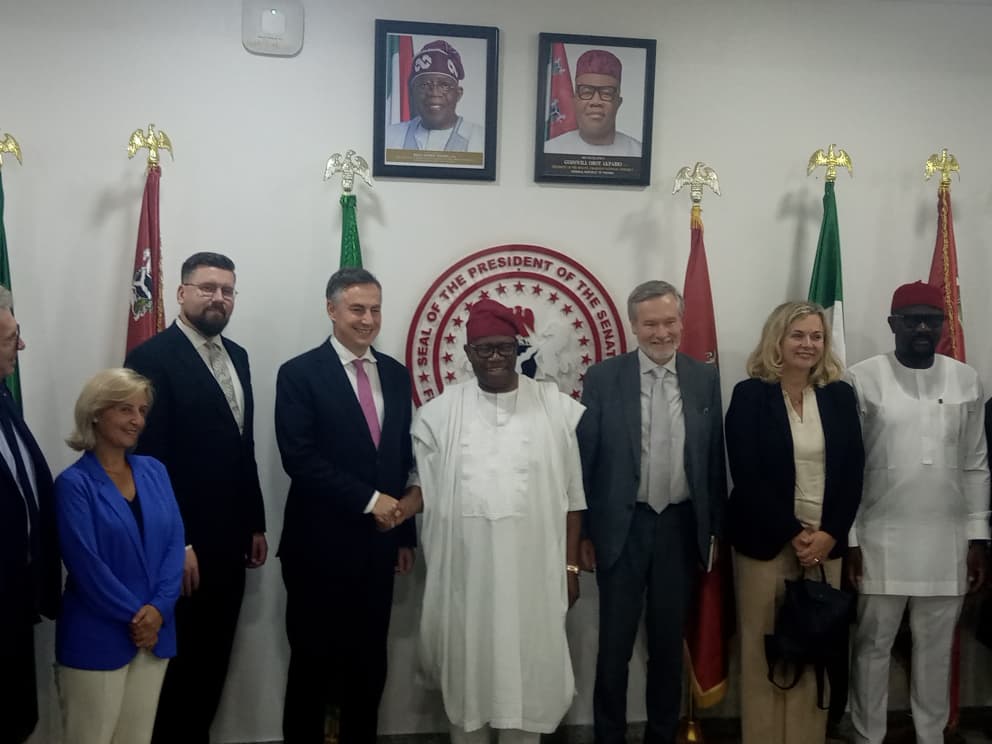Economy
All is now set for President Muhammadu Buhari Thursday visit to Maiduguri. The News Agency of Nigeria (NAN) reports that the visit is the third working visit by the president to Maiduguri in one year after that of June 17 and December 23 in 2021. While in Maiduguri, Buhari is expected to unveiled humanitarian support to vulnerable persons, commissioned teachers quarter in Bukumkutu ward and 500 resettlement houses in Molai executed by the state government. He is also expected to pay homage on the Shehu of Borno. Members of the public on transit have been advised to move out as early as possible to avoid road blockade occasioned by such visits.

The National Bureau of Statistics (NBS), says Nigeria’s headline inflation rate increased to 19.64 per cent on a year-on-year basis in July.
Prince Semiu Adeniran, the Statistician-General of the Federation and Chief Executive Officer, National Bureau of Statistics (NBS) said this in the Consumer Price Index (CPI) for July 2022 released by the bureau in Abuja on Monday.
Giving a breakdown of the report in a statement, Adeniran said that the CPI measures the average change over time in the prices of goods and services consumed by people for day-to-day living.
According to him, it is a core macroeconomic indicator used in the derivation of the inflation rate for policy, planning, and monitoring of an economy.
Adeniran said the report showed that in July 2022, on a year–on–year basis, the headline inflation rate was 19.64 per cent.
“This is 2.27 per cent points higher compared to the rate recorded in July 2021, which was 17.38 per cent.
“This shows that the headline inflation rate increased in July 2022 when compared to the same month in the previous year of July 2021.
“This means that in July 2022, the general price level was 2.26 per cent higher than in July 2021.’’
He said increases were recorded in all Classification of Individual Consumption by Purpose (COICOP) divisions that yielded the Headline index.
Adeniran said the increase in inflation was caused by an increase in food index attributed to the disruption in the supply of food products.
The statistician-general also said the increase in inflation was caused by an increase in the cost of transportation arising from the higher cost of energy.
According to him, the increase in the inflation rate was also due to an increase in import costs as a result of currency depreciation, as well as a general increase in the cost of production.
He said on a month-on-month basis, the headline inflation rate in July 2022 was 1.817 per cent, which was higher than the rate recorded in June 2022 at 1.816 per cent.
“The percentage change in the average CPI for the twelve months ending July 2022 over the average of the CPI for the previous twelve months period was 16.75 per cent.
“This is showing a 0.46 per cent increase compared to 16.30 per cent recorded in July 2021.’’
Adeniran said the composite food index on a year-on-year basis was 22.02 per cent in July 2022, showing a rise compared to 21.03 per cent in July 2021.
He said the rise in the food index was caused by increases in prices of Bread and cereals, Food products, potatoes, yam, and other tubers, meat, fish, oil, and fat.
The statistician-general said on a month-on-month basis, the food sub-index in July 2022 was 2.04 per cent lower than the 2.05 per cent recorded in June 2022.
“The index for all items less farm produce (Core inflation), which excludes the prices of volatile agricultural produce stood at 16.26 per cent in July 2022 on a year-on-year basis.
“This was higher when compared to 13.72 per cent recorded in July 2021. On a month-on-month basis, the core sub-index was 1.75 per cent in July 2022 higher when compared to 1.56 per cent recorded in June 2022.
He said the highest increases were recorded in prices of gas, liquid fuel, solid fuel, passenger transport by road, passenger transport by air, garments, cleaning, repair and hire of clothing.
Adeniran said on a year-on-year basis, in July 2022, the urban inflation rate was 20.09 per cent, 2.08 per cent higher compared to 18.01 per cent recorded in July 2021.
He said on a month-on-month basis the urban inflation rate was 1.82 per cent in July 2022, showing a decline compared to June 2022 at 1.82 per cent.
Adeniran said the rural inflation rate in July 2022 was 19.22 per cent on a year-on-year basis, which were 2.47 per cent higher compared to the 16.75 per cent recorded in July 2021.
“On a month-on-month basis, the rural inflation rate in July 2022 was 1.811 per cent, which was higher compared to June 2022 at 1.809 per cent.’’
Adeniran said all Items Inflation for the states in July 2022 on a year-on-year basis was highest in Akwa Ibom with 22.88 per cent, followed by Ebonyi with 22.51 per cent, and Kogi with 22.08 per cent.
The statistician-general said the slowest rise was recorded in Jigawa with 16.62 per cent, followed by Kaduna State with 17.04 per cent and Borno with 18.04 per cent.
Adeniran said on a month-on-month basis, July 2022 recorded the highest increase in Adamawa with 2.87 per cent, followed by Abuja with 2.84 per cent, and Oyo State with 2.77 per cent.
“While Bauchi recorded the slowest rise on month-on-month inflation with 0.82 per cent, followed by Kano State with 0.83 per cent and Niger State with 1.03 per cent.’’
He said Food Sub-index Inflation for the states in July 2022 on a year-on-year basis was highest in Kwara with 29.28 per cent, followed by Akwa Ibom with 27.22 per cent, and Kogi with 26.08 per cent.
The statistician-general said Kaduna State recorded the slowest rise in food inflation year-on-year with 17.16 per cent, followed by Jigawa with 17.46 per cent and Anambra with 19.25 per cent.
Adeniran said on a month-on-month basis, the food inflation sub-index was highest in Kwara with 3.90 per cent, followed by Delta with 3.61 per cent, and Benue with 2.94 per cent.
While he said Taraba, Gombe, and Niger recorded the slowest rise on a month-on-month inflation with 0.14 per cent, 0.94 per cent, and 1.13 per cent respectively.
Economy
JUST IN: FG Halts Planned 15% Import Duty on Petrol, Diesel

By: Fabian Apechihin
The Federal Government has suspended the planned implementation of a 15 percent import duty on petrol and diesel.
This was disclosed on Thursday by George Ene-Ita, Director of Public Affairs at the Nigerian Midstream and Downstream Petroleum Regulatory Authority (NMDPRA), who urged Nigerians to avoid panic buying.
President Bola Tinubu had earlier, on October 29, approved the imposition of the tariff following a proposal by the Executive Chairman of the Federal Inland Revenue Service (FIRS), Zacch Adedeji. The approval, conveyed in a letter signed by the President’s Private Secretary, Damilotun Aderemi, was intended to take effect from November 21, 2025.
The proposed policy sought to impose a 15 percent duty on the cost, insurance, and freight (CIF) value of imported petrol and diesel. It was aimed at supporting domestic refineries — such as the Dangote Refinery and modular plants — by making imported fuel less competitive. However, experts cautioned that the move could lead to an increase of up to ₦150 per litre in pump prices and further fuel inflation and transportation costs.
In its latest update, the NMDPRA confirmed that the import duty is no longer under consideration.
“It should also be noted that the implementation of the 15% ad-valorem import duty on imported Premium Motor Spirit (PMS) and Automotive Gas Oil (Diesel) is no longer in view,” the Authority stated.
The agency further assured the public of adequate fuel availability across the country, noting that national stock levels remain within the required sufficiency threshold.
“There is a robust domestic supply of petroleum products — including PMS, AGO, and LPG — from both local refineries and imports, ensuring timely replenishment of depots and retail stations,” the statement added.
NMDPRA cautioned marketers against hoarding, panic buying, or arbitrary price increases, emphasizing that it will continue to monitor the market to prevent any disruption in supply.
“While appreciating the efforts of stakeholders in maintaining smooth and uninterrupted supply, the public is assured of NMDPRA’s commitment to safeguarding national energy security,” the statement concluded.
Economy
FGN, Sign $400m Deal To Boost Local Steel Production

From Hassan Taiye
The Federal Government of Nigeria, FGN, through the Ministry of Steel Development, has signed a Joint Strategic Cooperation Declaration with Stellar Steel Company Limited.
Stellar Steel Company Limited is a steel-manufacturing enterprise established to operate in Nigeria, with major investment backing from Chinese parent groups: Galaxy Group and RSIN Group based in Fuzhou, Fujian Province, China.
The company has committed approximately US$450 million for a steel plant project in Ogun State, Nigeria, scheduled to begin operations by mid-2026.
This landmark partnership is aimed at revitalising Nigeria’s steel industry and reducing the nation’s dependence on imported steel products, according to a statement signed by the the Principal Information Officer, PIO, Ijomah Opia, for the director, Information and Public Relations in the ministry.
The agreement, signed in Abuja, on Tuesday 28th October, 2025 will see Stellar Steel invest $400 million in the construction of a modern Steel Plant in Ewekoro, Ogun State. The project will be developed in three phases, with the first phase expected to begin production by 2026.
The Minister of Steel Development Prince Shuaibu Abubakar Audu signed the agreement when he hosted Mr Li, President of Inner Galaxy Group and other members of the Stellar Steel Company Limited in the Ministry’s Headquarters in Abuja.
According to Prince Audu, the collaboration aligns with the federal government’s goal of achieving 10 million tonnes of crude steel production per annum by 2030, a major step toward industrial self-reliance and economic diversification.
The minister further stated that the Federal Ministry of Steel Development would facilitate policy and infrastructure support, including inclusion of Stellar Steel’s logistics projects in the National Infrastructure Plan and access to available fiscal incentives.
Highlights of the cooperation includes the followings:
1.Development of a localised iron ore supply chain to reduce import dependence and save over $1 billion in foreign exchange annually.
- Creation of more than 2,000 direct and 20,000 indirect jobs across the steel value chain.
- Promotion of green steel production using clean and energy-efficient technologies.
- Strengthening of Nigeria’s position as a regional steel manufacturing hub in West Africa.
Audi also said that in return, Stellar Steel would prioritise local recruitment and training, partnering with Nigerian universities to build technical and managerial expertise in steel production.
Prince Shuaibu emphasised that this strategic cooperation marks a new era for Nigeria’s steel industry and demonstrates the government’s commitment to sustainable industrial growth and economic transformation.
In his remarks the leader of the delegation, Mr Li assured the minister that Stellar Steel would respect all agreements reached and would ensure the completion of the project in record time and assured that all safety standards will be observed.
Mr Li was accompanied during the visit by Mr You Xiastian, Vice Chairman of RSIN Group, Mr Jackie Den, Vice President of Inner Galaxy Group and Mr Yin, Director of RSIN Group.
He recalled that the Minister of Steel Development, Prince Audu, performed the groundbreaking ceremony of the Steel Plant in Ogun State sometime in April, 2025.
Speaking at the signing, representatives of both parties emphasised that the partnership would strengthen Nigeria’s industrial base, create jobs, and foster technology transfer in the sector.
Economy
EU Delegation Strengthens Ties with Nigerian Senate

From Hassan Taiye
A high-level delegation from the European Union (EU) Parliament’s Foreign Affairs Committee, led by Mr. David McAllister, paid a courtesy visit to the Nigerian Senate today October 28, 2025.

“We are here to deepen our understanding of the situation in West Africa and strengthen our partnership with Nigeria,” McAllister said.
Senate President Godswill Akpabio welcomed the delegation, emphasizing Nigeria’s strategic partnership with the EU. “Nigeria is committed to strengthening ties with the EU, highlighting areas of mutual interest, including security, trade, and governance,” Akpabio said.
The delegation, comprising Ambassador Greta Mylott, EU Ambassador to Nigeria and ECOWAS, Miss Zelaya Zorko, Miss Mata Tamido, Sebastian Tankman, General Christophe Gomart, and Sebastian Buharo, is undertaking a comprehensive tour of West Africa, with stops in Nigeria and Ghana.
During the visit, Akpabio shed light on the challenges facing female representation in Nigeria’s parliament. “Women often vote for male candidates, making it difficult for female candidates to win elections,” he noted.
“The Senate is exploring innovative solutions, including constitutional amendments, to boost female participation in the legislative process, with support from organizations like the Black Women’s Forum.”
The EU delegation’s visit aims to foster greater understanding and cooperation between the EU and Nigeria, addressing shared concerns, such as terrorism, climate change, and economic development.
“The EU is committed to supporting Nigeria’s development efforts,” McAllister assured the Senate, emphasizing the bloc’s interest in seeing a stable, prosperous, and democratic Nigeria.
Their visit also includes participation in the forthcoming International Islamic Conference on Security and Governance in West Africa and the Sahel, scheduled for November 4-6, 2025 at ECOWAS Commission.
Akpabio expressed optimism about the potential for enhanced cooperation, highlighting Nigeria’s readiness to work with the EU to address common challenges.
-

 Uncategorized5 years ago
Uncategorized5 years agoFG, states urged to harness flooding for ranching, others with technology – Agbaje
-

 Headlines10 years ago
Headlines10 years agoBreaking: EFCC seals Borno House of Assembly, as Hon members take to their heels
-

 News11 years ago
News11 years agoNigeria Security Operatives Stage Manhunt For Homosexual Perpetrator
-

 News9 years ago
News9 years agoHow 21-year-old Girl fled community over accusation of lesbianism
-

 News10 years ago
News10 years agoYobe Gov Moves Against Deputy
-

 Opinion7 years ago
Opinion7 years ago7 signs she has friend zoned you
-
Technology4 years ago
Online job placement company headhunts women
-

 Headlines10 years ago
Headlines10 years agoBorno Dep Gov Abducts Another Church Leader





